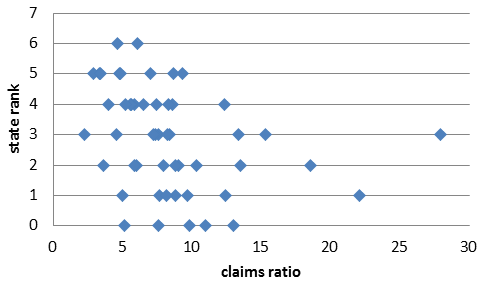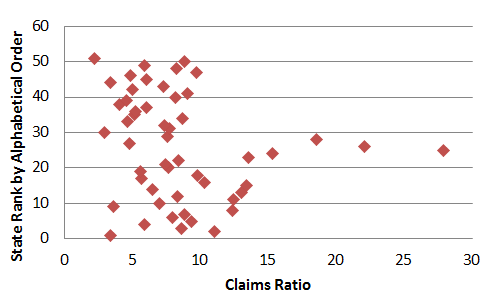This week, title insurance rating agency Demotech published a study, "Escrow Theft: Today's Challenge in Title Insurance", in which Demotech compares title insurance claims ratios for each state from 2004 to 2011 to its own ranking of the strength of each state's title agent regulations. From that data Demotech concludes that states with stronger title agent regulation have lower rates of escrow theft.
Unfortunately, the study falls well short of actually showing any link between title agent regulations and lower losses due to escrow theft.
Demotech's data is not strong evidence for its claims, even taken at face value
Demotech originally conducted similar analysis in 2003, saying that it originally conducted the analysis because it "observed the impact of escrow theft on the industry and noticed a significant correlation between the strength of states’ title agent regulations and loss ratios reported by title underwriters. In light of this observation, Demotech undertook a study to analyze the relationship between the strength of state regulations and loss ratios for title insurance."
There are statistical methods to analyze ranked data, but Demotech did not present such analysis, providing no graphs, nor any measures to indicate that the data actually supports their conclusion. Instead, it took averages of the average of the groups of states for each regulation strength ranking value from zero to six, and bases its conclusion on these seven averages of averages. Calculating averages of averages like Demotech did is a questionable analytical step, but it enabled Demotech to report that the group of states with the lowest regulation had a relatively high average claims ratio of 9.32%, when the actual cumulative claims ratio of those lowest ranked states was only 6.25%-- lower than the cumulative claims ratio of the two groups with the strongest regulation (6.78%)!
Below is a scatterplot of the data:

Looking at the data, it appears there is some correlation between a higher state ranking and a lower claims ratio-- notice how dots nearer the top tend on average to be a little left of the dots nearer the bottom. The data set is small, which would tend to weaken the statistical significance of any detectable patterns. But is the correlation significant?
Not necessarily.
Just because there is some detectable correlation between two variables in a data set does not mean that there is a significant cause and effect relationship between the variables, especially in small data sets. In the graph below, I ranked the states alphabetically and graphed their alphabetical ranking against their claims ratios. Does the distribution of the data points look pretty similar to the graph above?

The data appears to show that states with names that start with letters late in the alphabet have claims ratios that tend to be lower than states that start with letters early in the alphabet. In fact, alphabetical rank is about as good a predictor of a claims rate as Demotech's regulatory ranking. But obviously, there is no cause and effect relationship; otherwise, Alabama could fight escrow fraud by simply changing its name to "Zalabama"!
Simply put, the correlation shown in Demotech's data is weak-- weak enough that it could be suspected to be entirely coincidental, even if we accept the basis for the rankings and all of Demotech's assumptions. As I'll discuss below, those assumptions further undercut Demotech's conclusions.
Demotech's ranking of state regulation of title agents is subjective
In the process of trying to analyze if "strong" regulations are superior to "weak" regulation in preventing escrow theft, Demotech had to make very debatable value judgments regarding what is strong regulation and what is weak regulation. For example, Demotech gave no weight whatsoever to state regulation that requires title agents to be a licensed attorneys, despite elsewhere stressing that a "barrier of entry to the profession" was "of primary importance" in its analysis.
In Kentucky, anyone who can fog a mirror can be a title agent tomorrow-- they do not regulate title agents. In Massachusetts, you apparently need to fog a mirror AND have a law license. Demotech ranked them equally in the weakest group. In its reasoning for ranking Massachusetts as a 0 on its scale of 0 to 6, Demotech says:
Massachusetts is rated a 0 because it has no express regulations pertaining to title agents, escrow agents, or the closing process. While Massachusetts imposes a de facto regulation by limiting closing activities to attorneys, such an enforcement mechanism is ill-defined and the scope of this limitation is currently disputed. An essential element of a strong regulation is clarity. Although Massachusetts is similar to Connecticut in that attorneys generally act as title agents and escrow agents, the lack of clarity of Massachusetts’ regulation renders it very weak.
Other states that require title agents to be licensed attorneys were given low regulation scores. In Connecticut, where Demotech says there is no dispute that only attorneys can be title agents, they only rank the state as a 1 out of 6, the second weakest possible ranking.
In many other respects, the methodology used to rank the states in term of the strength of the title agent regulations seems subjective to the point of near uselessness. In fact, any such ranking would be so subjective as to be really "for entertainment purposes only".
It perhaps would have been somewhat more useful to isolate one key regulation at a time, separate the states with that one regulation from the states without it, and then see if any patterns emerged.
Demotech did not consider differences in title insurance rates among the states
Consider two hypothetical states, State A and State B. The states are virtual clones of each other-- both states have identical laws governing title agents and are therefore given the same ranking by Demotech. The transaction volume in each state is virtually the same, and so is the claim volume. There is one difference however: in State A, the title insurance rate is set twice as high as State B, so twice the amount of premiums is collected. Since the claims ratio is premium amount divided by claims amount, the claims ratio in State A is half that of state B.
Obviously, the difference in claims ratios between State A and State B is not due to better regulation of title agents that is preventing escrow theft, since the states' regulations governing title agents are identical. Only the title insurance rates are different. The difference in claims ratios is solely due to title insurance rates.
A real world example: of all states, Missouri had the highest claims ratio during the study period, according to Demotech. But Missouri also appears to have among the lowest title insurance rates in the country. New York has among the lowest claims ratios, but their title insurance rates are among the highest. Missouri's claims ratio looks worse than it actually is, and New York's looks better, for reasons that have nothing to do with title agent regulations.
Laws, customs, and other factors can significantly affect claims rates
Title agency regulations are simply not the only state laws that affect claims rates. A good example just recently is the situation in North Carolina, where the largest underwriter was experiencing unusually high claims rates due to state law regarding construction liens, which I happened to write about just a few days ago.
But state laws are not the only thing that varies from state to state. In its analysis, Demotech explicitly states:
Demotech operated under the assumption that almost all states require title insurance agents and title insurance companies to make an exhaustive search of public records and that those individuals performing title searches had reasonable experience and conducted a reasonably thorough search. Accordingly, Demotech assumed that variations in loss experience from state to state are based upon dynamic occurrences rather than static occurrences. In short, we assumed that each state would incur losses inherent in the business of title insurance and that such losses would be relatively consistent from state to state. Therefore, any variation in the loss ratios would correspond with an occurrence apart from a typical title insurance loss, namely escrow theft. Limitations on the readily available public information on the title insurance industry preclude verification of this critical assumption.
This assumption about the quality of title search being relatively equal everywhere may very well be false. In some states, land records are online for all counties, and searches can be performed out of state, overseas, or even by automated systems like NextAce. In other states, few counties are online, and title searching is mostly performed locally. In a few states, searchers must be licensed.
Any study of this kind will require assumptions... but an abundance of "critical" assumptions will just completely undermine any conclusions, and that is the case here.
Other variables probably affect claims ratios. On a hunch, I graphed peak to trough house price declines against claims ratio, suspecting that states where house prices had fallen a lot would tend to have higher claims ratios, due to more fraud during the bubble, greater losses per mortgage, more foreclosures, and more folks looking for deep pockets to bail them out of losses. Surprisingly to me, there was almost no correlation. Since the period under study dates back to 2004, it could be that all the bubble area premiums that title companies collected have offset the losses since then.
Small sample size
While we're talking about sample size: in a small state, one or two clever criminals can really rack up the claims and skew the data! Mississippi was one of only two states with a claims ratio over 20%, but that was likely mostly due to one criminal enterprise, the Evans brothers' fraud, which caused tens of millions in losses. Perhaps there is lessons for Mississippi legislators to learn from that crime that involve changes to its title agency regulations, or perhaps it was an isolated incident unlikely to be repeated under existing law.
Confirmation bias?
Confirmation bias is a well known and proved tendency of human beings to interpret information in ways that confirms what they believe. Demotech explicitly says that when it undertook the study, it did so believing that there was a correlation between stronger regulation and lower claims ratios. When the analysis requires so much subjective judgment, there are hazards in anticipating a particular outcome of the analysis. There is a danger of the analyst subconsciously noticing that a state has a high or low claims ratio, and ranking that state higher or lower on strength of regulation in order to bolster the apparent correlation.
Conclusion
By no means am I dismissing strong title agent regulation. The NAIC Title Insurance Agent Model Act, which Demotech seems to favor, seems to be a sensible starting point for title agent regulation. But time after time, we have seen title agents meet every state licensing requirement and then turn around and succumb to the temptation of stealing from their escrow account, even in states which Demotech says have strong regulations. I do not see anything in this paper to convince me that title agent regulations necessarily have much of an effect on that particular problem.